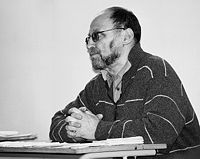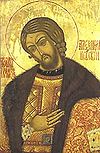- Dmitri Prigov
-
Dmitri Aleksandrovich Prigov 
Born 5 Nov 1940 Died 16 July 2007 (aged 66) Occupation Writer & Artist Nationality Russian Dmitri Aleksandrovich Prigov (Cyrillic: Дми́трий Алекса́ндрович При́гов) (5 November 1940 – 16 July 2007[1]) was a Russian writer and artist. Prigov was a dissident during the era of the Soviet Union and was briefly sent to a psychiatric hospital in 1986.[2]
Contents
Early life and career
Born in Moscow, Russian SFSR, Prigov started writing poetry as a teenager. He was trained as a sculptor, however, at the Stroganov Art Institute in Moscow and later worked as an architect as well as designing sculptures for municipal parks.[2]
Artistic career
Prigov and his friend Lev Rubinstein were leaders of the conceptual art school started in the 1960s viewing performance as a form of art. He was also known for writing verse on tin cans.[2]
He was a prolific poet having written nearly 36,000 poems by 2005.[2] For most of the Soviet Era, his poetry was distributed as Samizdat circulating underground with his poetry not being officially published until the end of the Communist era.[1] His work was widely published in émigré publications and Slavic studies journals well before it was officially distributed.
In 1986, the K.G.B arrested Prigov, who performed a street action by handing poetic texts to passers-by, and sent him to a psychiatric institution before he was freed after protests by poets such as Bella Akhmadulina.[2]
From 1987 he started to be published and exhibited officially, and in 1991 he joined the Writers’ Union. He had been a member of the Artists’ Union from 1975.
Prigov took part in an exhibition in the USSR in 1987: his works were presented in the framework of the Moscow projects “Unofficial Art” and “Modern Art”. In 1988 his personal exhibition took place in the USA, in Struve’s Gallery in Chicago. Afterwards his works were many times exhibited in Russia and abroad.
Prigov also wrote the novels Live in Moscow and Only My Japan, and was an artist with works at the Moscow Museum of Modern Art.[3] He had many strings to his bow writing plays and essays, creating drawings, video art and installations and even performing music.[2]
Prigov, together with philosopher Mikhail Epstein, is credited with introducing the concept of "new sincerity" (novaia iskrennost' ) as a response to the dominant sense of absurdity in late Soviet and post-Soviet culture.[4][5] Prigov referred to a "shimmering aesthetics" that (as explained by Epstein) "is defined not by the sincerity of the author or the quotedness of his style, but by the mutual interaction of the two."[4]
In 1993 Prigov was awarded Pushkin Prize of Alfred Toepfer Stiftung F.V.S. and in 2002 he won Boris Pasternak Prize.
Dmitri Prigov died from a heart attack in 2007, aged 66, in Moscow. He had been planning an event where he would sit in a wardrobe reading poetry while being carried up 22 flights of stairs at Moscow State University.[1]
Spelling of his name
Prigov's name in his native Russian Cyrillic lettering, Дми́трий Алекса́ндрович При́гов, has been rendered in English in various ways, with variations in the spelling of his first and middle names:
- Dimitri Prigov – Associated Press,[6] The New York Times
- Dimitrii Aleksandrovich Prigov[7]
- Dimitrij Aleksandrovich Prikov, Russian Literature, a periodical[8]
- Dmitry Aleksandrovich Prigov – Encyclopaedia Britannica[9]
- Dimitry Prigov – The St. Petersburg Times (English language, Russia)[10] The Moscow Times[11]
References
- ^ a b c Dmitri Prigov, leader of conceptualist school, dies at age 66 news agency AP via International Herald Tribune, 16 July 2007
- ^ a b c d e f New York Times "Dmitri Prigov, 66, Poet Who Challenged Soviet Authority, Dies" July 20 2007
- ^ Russian Culture Navigator
- ^ a b Mikhail Epstein, "On the Place of Postmodernism in Postmodernity," in Mikhail Epstein, Aleksandr Genis, Slobodanka Vladiv-Glover, eds., Russian Postmodernism: New Perspectives on Post-Soviet Culture (Berghahn Books, 1999), ISBN 9781571810984, p. 457, excerpt available at Google Books.
- ^ Alexei Yurchak, "Post-Post-Communist Sincerity: Pioneers, Cosmonauts, and Other Soviet Heroes Born Today," in Thomas Lahusen and Peter H. Solomon, eds., What Is Soviet Now?: Identities, Legacies, Memories (LIT Verlag Berlin-Hamburg-Münster, 2008), ISBN 9783825806408, p.258-59, excerpt available at Google Books.
- ^ "Obituaries in the News", USA Today, Associated Press wire stories, including "Dimitri Prigov" brief obituary; see also "Russian poet Dmitri Prigov dies, age 66", version of same AP article at The Free Online Library website; both retrieved January 14, 2009
- ^ Lipovetsky, Mark, and Eliot Borenstein, Russian Postmodernist Fiction: Dialogue with Chaos, p 302, published by M.E. Sharpe, 1999, ISBN 9780765601773
- ^ as noted in a bibliographic listing in Reference Guide to Russian Literature, p 663, Neil Cornwell, Nicole Christian, editors, published by Taylor & Francis, 1998, ISBN 9781884964107; the Reference Guide itself uses "Dimitrii Aleksandrovich Prigov"; retrieved January 14, 2009
- ^ "Russia" section of "Literature" article in Britannica Book of the Year 2007, published by Encyclopaedia Britannica, 2008, online version retrieved January 14, 2009
- ^ Kishkovsky, Sophia, "Dmitry Prigov 1940-2007: A Russian poet and performance artist whose work was respected in the west", July 27, 2007reprint of New York Times obituary; retrieved January 14, 2009
- ^ Peter, Thomas, "Artists Mock Establishment With Sense of Absurd", Reuters article as printed in The Moscow Times, July 24, 2008, retrieved January 14, 2009
External links
- The End(s) of Russian Poetry: An Interview with Dmitry Prigov by Philip Metres
- Dimitry Alexandrovich Prigov, Soviet-Era Avant-Garde Poet and Artist, Rest in Peace an overview that includes some Prigov poems
- Russia’s leading conceptualist poet has died poet Ron Silliman provides a useful momento to Prigov, with links to pieces on Prigov, including Silliman's own blog-essay from March 22, 2006
- Biography of Dmitri Prigov (English)
People from Russia Leaders and religious - Pre-1168
- 1168–1917
- 1922–1991
- 1991–present
- RSFSR leaders
- General secretaries
- Soviet premiers (1st deputies)
- Soviet heads of state (and their spouses)
- Prime ministers (1st deputies)
- Foreign ministers
- Prosecutors general
- Metropolitans and patriarchs
- Saints

Military and explorers - Field marshals
- Soviet marshals
- Admirals
- Aviators
- Cosmonauts
Scientists and inventors - Aerospace engineers
- Astronomers and astrophysicists
- Biologists
- Chemists
- Earth scientists
- Electrical engineers
- IT developers
- Linguists and philologists
- Mathematicians
- Naval engineers
- Physicians and psychologists
- Physicists
- Weaponry makers
Artists and writers Sportspeople Chess playersCategories:- Russian artists
- Russian poets
- Russian novelists
- Deaths from myocardial infarction
- 1940 births
- 2007 deaths
- People from Moscow
- Pushkin Prize winners
Wikimedia Foundation. 2010.
